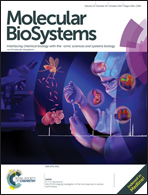CXCR7 attenuates the TGF-β-induced endothelial-to-mesenchymal transition and pulmonary fibrosis†
Abstract
Lung fibrosis is a progressive and often fatal lung disease characterized by fibroblast proliferation and excessive deposition of extracellular matrix in the lungs. The chemokine receptor CXCR7 has been shown to control cell adhesion, migration and proliferation by regulating the epithelial-to-mesenchymal transition (EMT), but the role of CXCR7 in regulating the endothelial-to-mesenchymal transition (EndMT) and lung fibrosis remains largely unclear. In this study, we investigated the interrelation of CXCR7 and TGF-β, a crucial player in lung fibrogenesis. We report herein that CXCR7 expression is significantly increased in animal models of TGF-β1-induced pulmonary fibrosis and in TGF-β1-treated endothelial cells. TGF-β1 up-regulates CXCR7 expression in a Smad2/3-dependent manner in endothelial cells. The overexpression of CXCR7 effectively attenuates TGF-β1-induced EndMT in lung endothelial cells, whereas CXCR7 knockdown in endothelial cells further promotes TGF-β1-induced EndMT. Mechanically, CXCR7 attenuates EndMT by inhibiting the Jag1–Notch pathway. CXCR7 overexpression in mice also results in a significant enhancement in endothelial markers and a decrease in mesenchymal markers, indicating a decreased susceptibility to TGF-β1-induced lung fibrosis and deposition of extracellular matrix and collagen. These data suggest that CXCR7 upregulation induced by TGF-β is a feedback mechanism to regulate TGF-β-induced EndMT and pulmonary fibrosis.



 Please wait while we load your content...
Please wait while we load your content...